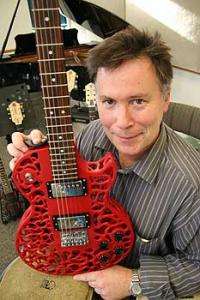Spider guitar dazzles with style and sound (w/ Video)

(Phys.org) -- Massey University mechatronics professor Olaf Diegel made his dream come true when he created a series of colourful 3D-printed electric guitars with latticed bodies adorned with spiders and butterflies.
And when he posted images of the prototypes, explaining their origins before launching an online business, musicians and design buffs worldwide were dazzled by the aesthetics and a deluge of inquiries ensued.
Now, punters can hear the decorative, brightly coloured instruments, with a demo by Massey jazz guitar tutor and freelance rock guitarist Neil Watson, of the New Zealand School of Music. Mr. Watson is based at the University’s Albany campus where Professor Diegel is a lecturer and researcher.
The clip is evidence that the custom-made instrument, which began as an experimental project, is not just a pretty gimmick. Not only does it sound as good as its mainstream counterparts, it symbolises a revolutionary era in manufacturing, says Professor Diegel.
Also known as additive manufacturing, 3D printing is the process of making three-dimensional solid objects from a digital file using a printer that deposits layers of plastic or metal powder, with each layer fused by a precision laser beam.
The process, used for high-end customised products or medical parts such as artificial hips, hearing aids and dental fittings, as well as niche designer items, is the future for manufacturing specific types of goods, says Professor Diegel, who is based at the School of Engineering and Advanced Technology.
“The whole purpose is customisation and trying to avoid waste,” he says. “It’s the next big thing in manufacturing, because you can create to order and modify the design to suit specific individual requirements, whether it’s for a new set of teeth, a door handle or a piece of jewelery.”
And in a decade or so, he predicts many households will have 3D printers for replacing or updating personal and household items, reducing the need for mass production that can lead to stockpiles, over-supply and, ultimately, waste. “It’s the next industrial revolution and it’s going to completely change the way we do things,” says Professor Diegel.
“New Zealand, a country largely made up of small companies making high-value products, can benefit enormously from these technologies, as they will be able to go to market with products without the current prohibitive tooling costs that often prevent them from getting their ideas off the ground”.
So far he has printed several small guitar bodies – such as the shocking pink ‘rock chick’ model – in New Zealand, and two larger ones in the United States because of the size of the machine needed. His school has several desktop 3D printers, which students use for small-scale engineering prototype projects, and he hopes a larger-scale machine will be on campus later this year.
Once the guitar bodies are printed they are manually fitted with inner wooden cores, which can be made of different types of wood, such as mahogany or maple, to adjust the guitar’s tone. The necks are made of maple or mahogany, with traditional tuning keys and strings added. The guitars will be sold via his ODD online site (www.odd.org.nz), and can be adapted to suit design tastes, colour and quirks of the buyer.
“If someone wants geckos, or flowers, or parts that can move, it will eventually all be possible through the online design software we are working on.”
But even if the guitars are a smash hit, he doubts even the most hard-core rocker will want to smash one as a performance antic.
Provided by Massey University





















